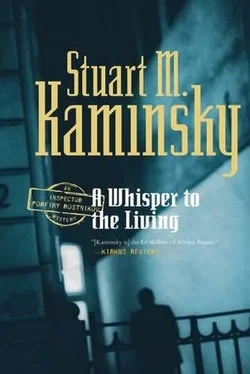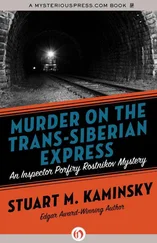Stuart Kaminsky - A Whisper to the Living
Здесь есть возможность читать онлайн «Stuart Kaminsky - A Whisper to the Living» весь текст электронной книги совершенно бесплатно (целиком полную версию без сокращений). В некоторых случаях можно слушать аудио, скачать через торрент в формате fb2 и присутствует краткое содержание. Год выпуска: 2009, Жанр: Полицейский детектив, на английском языке. Описание произведения, (предисловие) а так же отзывы посетителей доступны на портале библиотеки ЛибКат.
- Название:A Whisper to the Living
- Автор:
- Жанр:
- Год:2009
- ISBN:нет данных
- Рейтинг книги:4 / 5. Голосов: 1
-
Избранное:Добавить в избранное
- Отзывы:
-
Ваша оценка:
- 80
- 1
- 2
- 3
- 4
- 5
A Whisper to the Living: краткое содержание, описание и аннотация
Предлагаем к чтению аннотацию, описание, краткое содержание или предисловие (зависит от того, что написал сам автор книги «A Whisper to the Living»). Если вы не нашли необходимую информацию о книге — напишите в комментариях, мы постараемся отыскать её.
A Whisper to the Living — читать онлайн бесплатно полную книгу (весь текст) целиком
Ниже представлен текст книги, разбитый по страницам. Система сохранения места последней прочитанной страницы, позволяет с удобством читать онлайн бесплатно книгу «A Whisper to the Living», без необходимости каждый раз заново искать на чём Вы остановились. Поставьте закладку, и сможете в любой момент перейти на страницу, на которой закончили чтение.
Интервал:
Закладка:
“I am a very old-fashioned man.”
The sunhad begun to rise by the time Emil Karpo reached the street on which he lived. He had traveled without luggage and had not slept going or coming back from London.
One block away, he could see a gathering in an alcove near the entrance to his building. As he moved quietly closer, he could see that it was a group of six boys, bezprizorniki , children of the streets, homeless, dangerous. They were all bent over, looking down at something he could not see, calling out encouraging words.
Karpo touched the shoulders of two of the boys in his way. They looked up at him and parted. In the doorway was a boy with a stick. He was perhaps fifteen years old. He was dirty, as were they all, and their clothes were odd in size and they were obviously not slaves to fashion. The older boy was jabbing a black cat trapped against the door. With nowhere to go, the cat sat back and waved a paw at the prodding stick.
The boys called out, “Get him, Borka. Kill him. Let’s eat him.”
Karpo leaned over, took the stick from the boy called Borka, broke it, and dropped it on the pavement.
Borka, whose face was lopsided to the left, stood up in anger. He was almost half a foot shorter than Karpo, who knelt to pick up the cat, which did not resist.
Karpo tucked the cat under his right arm and faced the boy as he rose.
The boy could not decide whether to search for a way to back down or attack the intruder. There were six of them and only one of him. Every boy in the group had been through fights over food or shelter in which their lives were at stake. They would win, though something about the man’s pale, expressionless face made Borka hesitate.
“Give us your money and we will let you pass,” said Borka, moving to block the entrance.
“I cannot do that,” said Karpo.
“Why not?” asked one boy to his left.
“Because I am a police officer.”
Karpo pulled his badge from his back pocket and held it up.
Borka glanced at it and said, “We have faced policemen before.”
“Then,” said Karpo, returning his wallet to his pocket. “We shall have to see how you manage with this one.”
A caw of insults came from the mouths of those surrounding him as he moved to the door and removed the key from his pocket.
“ Meduk , asshole.”
“ Govniuk , shit head.”
Karpo could sense one of the boys, not Borka, step behind his back. He turned and faced a boy of no more than ten with a six-inch piece of pipe in his right hand.
The insults stopped. There was a mad look in the eyes of the boy and Borka stood at his shoulder.
“Bash him, Nicki,” a boy in the semicircle called.
As the boy was about to strike, Emil Karpo softly said, “No,” and the boy lowered his weapon. Karpo entered his apartment building and with his free hand made sure the door was locked behind him.
“We know where you live,” called Borka.
The threat meant little to Karpo. They would not want to do battle with a policeman, a policeman who would certainly have a hidden gun. There was nothing to be gained from confronting this unblinking ghost. The gang would almost certainly not return.
After climbing the stairs, he checked the door for the telltale hair that would inform him whether he had had company. There were no signs of company. He entered and put the cat down. The room was cold. The window was open. Nothing had been moved. Nothing had been touched. The narrow bed was hunched in one corner. The chest of drawers stood against one wall, with the freestanding closet at its side. Under the window stood a small, round wooden table with two chairs, and at the foot of the bed against the wall was a small sink and counter, with minimal dishes and utensils and a microwave. A few groceries, most conspicuously a large box of instant oatmeal, were lined up next to the microwave.
The entire remaining wall was covered with notebooks dealing with the investigations of all cases with which Karpo had been involved. The unresolved ones, the ones he worked on in the evenings and on his days off, were neatly labeled to the left on plain wooden shelves he had built.
He removed his clothes and placed them all neatly on a chair after removing something from his pocket. He held it up, looked at it, and brought the ocarina that Porfiry Petrovich had given to him to his lips. He blew into it gently, one note only. The cat’s ears turned to him and twitched. He placed the ocarina on his desk.
After two hours of rest on his bed in the nude and cold, he would rise and report to Chief Inspector Rostnikov.
Completely nude, Emil Karpo lay back atop the tautly tucked rough khaki military blanket on his bed and closed his eyes. Seconds later he was aware of a gentle movement on the bed to his left. The cat nestled down against his hip. Emil Karpo’s fingers touched smooth, silky hair. Then cat and man fell asleep.
Iosef knewthat Elena was as uncomfortable as he as they stood before the desk of the ZAGS officer.
ZAGS (Zapis Aktov Grazhdanskogo Sostoyaniya), the official bureau that handled Russia’s weddings, had to grant permission for every wedding, and once a request was denied, little or no recourse existed in the Russian bureaucracy.
ZAGS, an unimposing two-story half-block-long building, sat on the Butyrsky Ulitsa. In front of the shoe-box building, traffic ran heavily down the wide street and horns blared.
The mandatory thirty-second day after they had applied for their wedding license had come to an end. This was the final chance for either of them to back out of the brakosochetanie , the minimal but official service in the sparse office in which a fluorescent light twinkled and pinged.
Behind them stood the witnesses, Iosef’s mother and father and Elena’s aunt and cousin Edith. Iosef thought his father, two days out of the hospital, should not be there. Elena thought her aunt Anna, who awaited her probably inevitable fourth heart attack, should not be there. Elena and Iosef had no luck in convincing either one of them. Both Porfiry Petrovich and Anna Timofeyeva stood a few paces back, with Anna Timofeyeva between Porfiry Petrovich and Sara. Once Elena’s aunt had been a robust and often-uniformed procurator in the Soviet Union with Rostnikov as her chief investigator. But then both Anna Timofeyeva and the Soviet Union had collapsed.
According to tradition, Iosef had been picked up at his apartment by his parents, and Elena had come with her aunt and cousin. An unmarked police car, a black ZiL, had been provided by Porfiry Petrovich to transport Elena.
They had all met in the stark lobby that carried a nervous echo. Iosef wore his only suit, heavy and navy blue, with a white shirt and a blue-and-red-striped tie. Elena wore a white dress that Iosef had not seen before. She also wore a touch of makeup. To Iosef she looked healthy and beautiful.
Papers had been signed. The ZAGS officer, a lean, smiling man of about sixty, bore an uncanny resemblance to the American actor John Carradine. Iosef remembered an old movie in which Carradine, a consumptive prisoner in an Australian hellhole, saved the life of Brian Aherne by killing an oppressive guard by throwing sheep shears into the guard’s back. Iosef imagined the ZAGS officer reaching into his desk, pulling out scissors, and hurling them toward someone in the room.
The officer spoke, but Iosef, on the one hand, did not hear from his hiding place in the Australian outback. Elena, on the other hand, struggled to keep her attention on the words.
Abruptly the officer stopped and looked at both of them, waiting. Neither knew what to say or do. They looked at each other and smiled broadly, sharing a thought about the officer and the ceremony.
Читать дальшеИнтервал:
Закладка:
Похожие книги на «A Whisper to the Living»
Представляем Вашему вниманию похожие книги на «A Whisper to the Living» списком для выбора. Мы отобрали схожую по названию и смыслу литературу в надежде предоставить читателям больше вариантов отыскать новые, интересные, ещё непрочитанные произведения.
Обсуждение, отзывы о книге «A Whisper to the Living» и просто собственные мнения читателей. Оставьте ваши комментарии, напишите, что Вы думаете о произведении, его смысле или главных героях. Укажите что конкретно понравилось, а что нет, и почему Вы так считаете.












